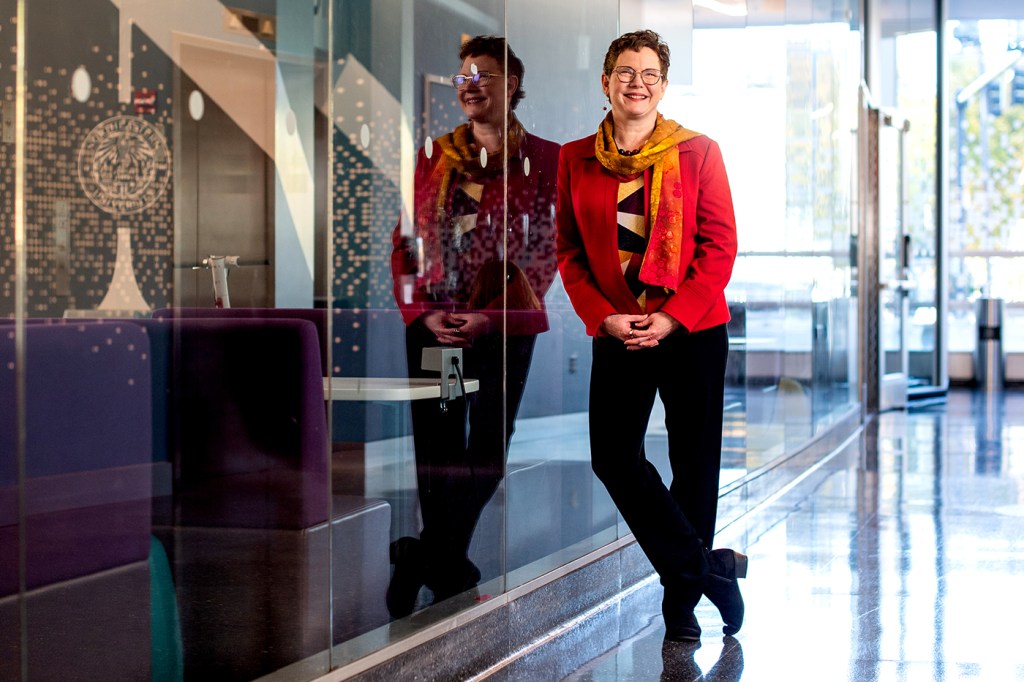Northeastern appoints human-centered computing pioneer as dean of the Khoury College of Computer Sciences

What will the field of computer science look like a decade from now, when it becomes even more integrated into other disciplines?
Elizabeth Mynatt, who will begin her role as Northeastern’s new dean of the Khoury College of Computer Sciences in January, poses this question as a way to think about both the challenges and opportunities that will arise in the burgeoning field, which is increasingly focused on problems that don’t just affect computers and systems, but human beings and their lives.
“That’s the attraction for Northeastern,” Mynatt said. “Northeastern is fundamentally interdisciplinary, and that shows in the fact that Northeastern is a leading institution in this field, and many others.”
Mynatt is joining Northeastern from the Georgia Institute of Technology, where she’s spent more than two decades—first as a doctoral student-turned-professor, then as executive director of Georgia Tech’s Institute for People and Technology. Forging groundbreaking connections between uniquely human abilities and technological advances has been foundational to her research over the years.
“The Khoury College of Computer Sciences is the center of a humanics education that integrates technological, data, and human literacies,” said Joseph E. Aoun, president of Northeastern University. “This approach to learning and discovery attracts the most inquisitive and versatile minds from within and beyond the field of computing. Elizabeth Mynatt is an innovator at the intersection of humans and technology and we welcome her to lead Khoury College through an exciting next phase of growth and knowledge creation across disciplines.”
David Madigan, provost and senior vice president for academic affairs at Northeastern, announced Mynatt’s appointment in an email to the university community on Monday.
“Elizabeth’s innovative approach to interdisciplinary collaboration and expertise in tackling issues that impact everyday life are key components of Northeastern’s ethos,” Madigan wrote. “I look forward to the new heights the college will achieve under her leadership.”
Before becoming executive director of the Institute for People and Technology, Mynatt served as director of Georgia Tech’s GVU Center, the “home of human-computing research innovation” at the college. She has held various leadership roles, including Associate Dean of the College of Computing and Director of the Aware Home Research Initiative.
Mynatt brings a proven track record as an industry pioneer, with numerous achievements to her name. As part of her Ph.D. work in the mid-90s, Mynatt helped design software that made graphical interfaces on computers accessible to people who were blind, helping to establish a set of protocols and approaches that have come to shape industry standards.
“We came up with a way of intercepting information as it made its way to the screen, creating a model of that information, and then presenting it with speech and non-speech sounds and braille,” Mynatt said.
For that work, Mynatt and her team were recognized in 2017 with an ASSETS Paper Impact Award, handed out to researchers who have had a “significant and sustained impact” on computing and information technology “that addresses the needs of persons with disabilities.”
While at Georgia Tech, Mynatt led the establishment of critical advanced degree programs, including the creation of the Ph.D. in human-centered computing, and the growth in the professional master’s program in human-computer interaction. The two curricula also reflect her own research interests, which she says are “in service of, and meant to amplify, what people could do in their day-to-day lives.”
“When you start with the inspiration coming from the outside, you create fundamentally different things,” Mynatt said.
Mynatt’s ongoing research looks at the effects of computing technology on everyday life, particularly within home health care.
“My biggest area has been in technologies for aging in place—how to support independence and quality of life as you age,” Mynatt said. “It’s places like [Northeastern] that are helping to make a difference, making the kind of work I spent my career doing possible, and then advancing it.”
Mynatt saw the opportunity at the helm of Khoury College as not just a way of strengthening the university’s leadership in the field, but as a way to “give back” to the community she’s been part of for decades.
“Northeastern is aggressively pursuing the future of the university,” she said, “and I think there is a recognition that Khoury College of Computer Sciences is a fundamental piece of that vision.”
Mynatt will succeed Khoury’s interim dean Alan Mislove, who had previously served in various leadership roles across Northeastern.
For media inquiries, please contact media@northeastern.edu.





